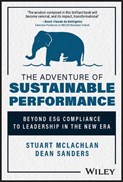- CSR
Sustainable Performance Leadership
A new guide helps businesses navigate towards net zero and social good with real impact and high performance

In The Adventure of Sustainable Performance, Stuart McLachan and Dean Saunders, principals at sustainability consultancy Anthesis, share their years of experience helping international clients transition to a future that demands the sustainable use of resources and seeks social fairness. The advice they give is realistic and achievable.
Relevant to all switched-on business leaders, their new book, which is illustrated with real-world cases, propels readers to lift their ‘sustainability’ thinking above and beyond mere ESG compliance and box-ticking to a goal of continuous value creation powered by creative vision and brave entrepreneurial enterprise. Theirs is a positive and hopeful message. The rewards for business and society are great, though the adventurous journey they describe is uncompromisingly challenging. There is no ‘green washing’ way out here.
At the book’s core is the fundamental tenet that ‘business as usual,’ with a few tweaks to limit environmental damage and a few benevolent social gestures, is not enough. Rather business leaders need to drive profound strategic change in order to adapt to and make a commercial success of a new post-carbon socially aware era.
Along with this is the acknowledgement that this new world order will not be achieved solely by government decree, by NGOs, or by champions of sustainability such as outdoor clothing company Patagonia—valuable as they are as catalysts for change. It is essential the power of fund managers and major corporations is harnessed to press for social change, and the expertise of the big oil companies redirected to delivering clean energy—Shell, Tesco, Unilever, and others are referred to here.
The authors’ several interviews with corporate CEOs and entrepreneurs reflect a clear concern and determination to leave a better world for future generations. With advances in technology, the advent of AI, increasing demand for eco-friendly investment, and pressure from younger generations, the times are ripe change. Despite the pressure this puts on business leaders in a complex uncertain world positive change is achievable and as this book shows is happening in places.
Having briefly laid out the true state of climate and social emergency facing the world, the authors’ focus is on practical and reachable solutions and the exciting new opportunities presented by transition. They propose a shift from a shareholder centred to a stakeholder centred approach to business. A key to their thinking is that compliance is a waymark and not an endpoint and that sustainable performance depends on activating a ‘total value system’ involving the complete supply chain and a ‘reapproach’ to business models.
The journey to achieving the change required involves carefully but resolutely dismantling what the authors term the ‘strongholds’ of the old era, accepting there is no viable status quo, and facing up to a difficult period of uncertainty and anxiety as new business models are adopted. Despite the urgency implicit in today’s fast-changing business environment, leaders need to think long-term allowing time to develop pilot initiatives and projects before scaling them up. They must also ensure sources of capital are available and investors onside to support innovative new directions, avoiding sinking funds into capital projects that may be stranded by disrupted markets or even literally stranded by floods or other climate related adversity.
Businesses and the capitalist system itself may be much maligned as perpetrators of the problems we are in—from melting ice caps to income inequality. But it is business rather than governments or non-profit institutions that have the agility, resources, and motivation to drive the transformative changes the world now urgently needs—and their stakeholders are now demanding. These authors, who use canoeing as a metaphor, provide a unique and valuable guide to navigating the complex issues sustainability leaders face—advising what needs to be done and how to go about it.
……………………………………………………………………………………………………………………
ARTICLES YOU MIGHT LIKE
BOOK REVIEW
A practical guide to sustainable corporate sourcing and running a scandal-free supply chain
DEVELOPING LEADERS QUARTERLY MAGAZINE AND WEEKLY BRIEFING EMAILS
































